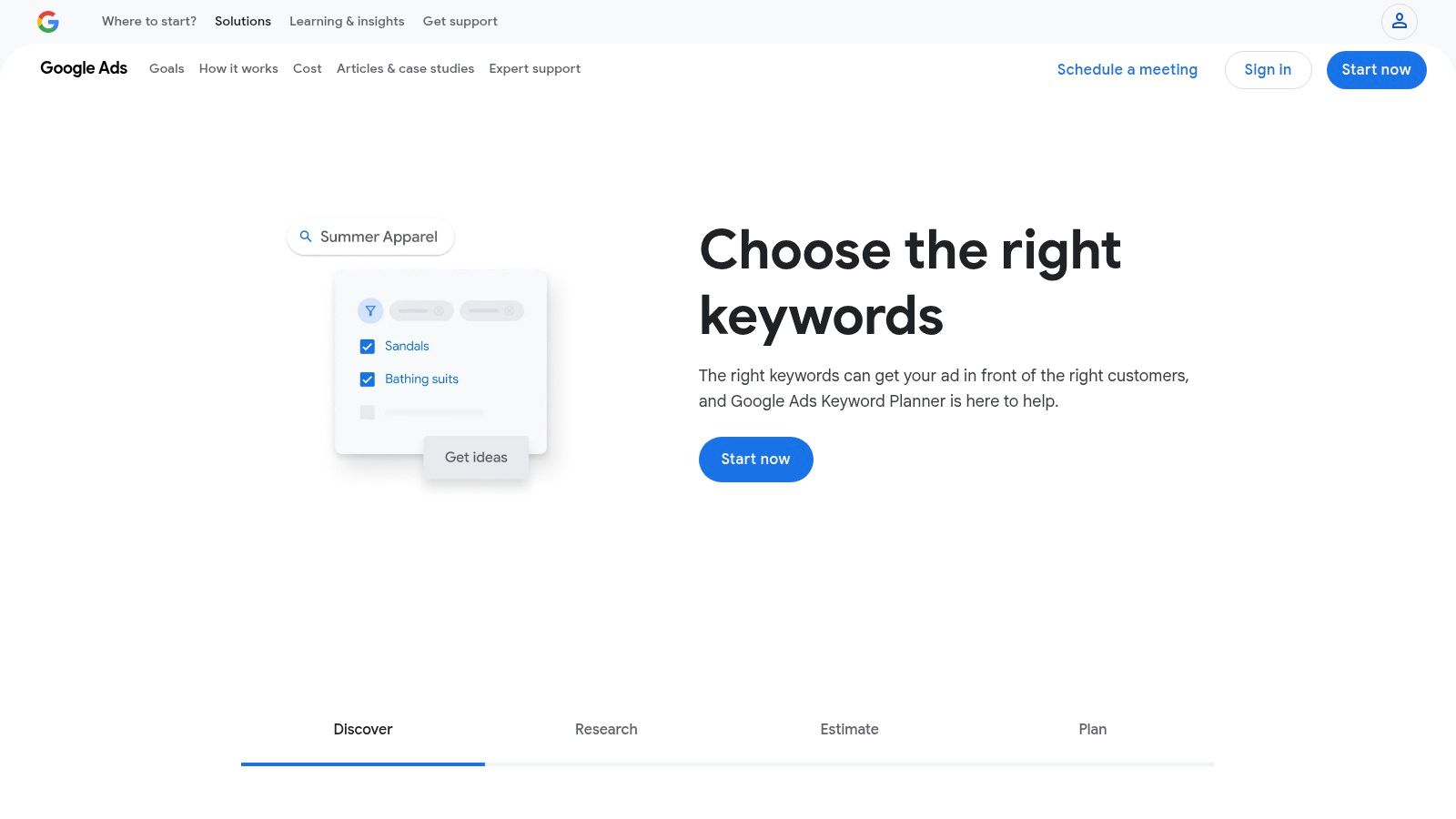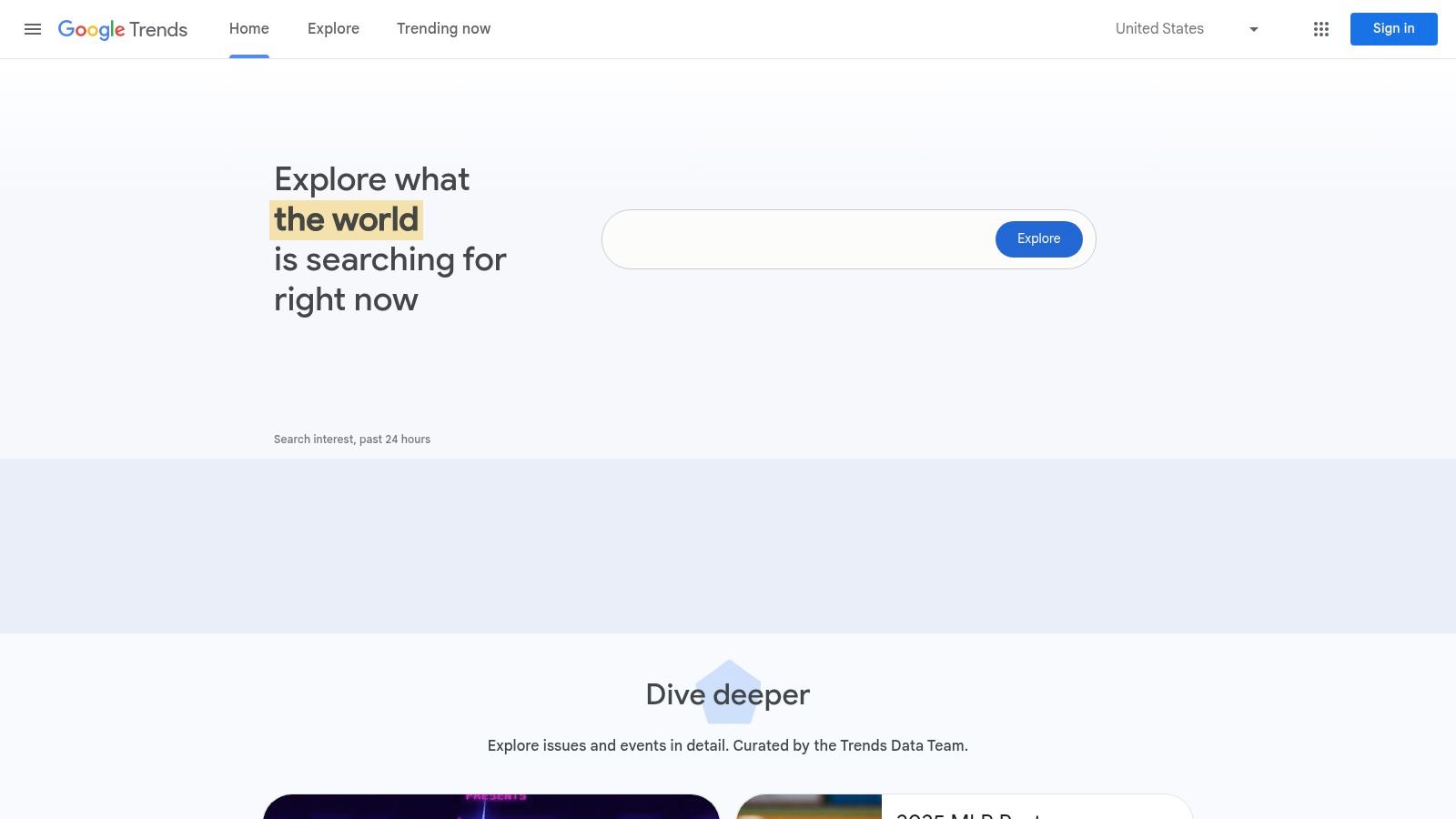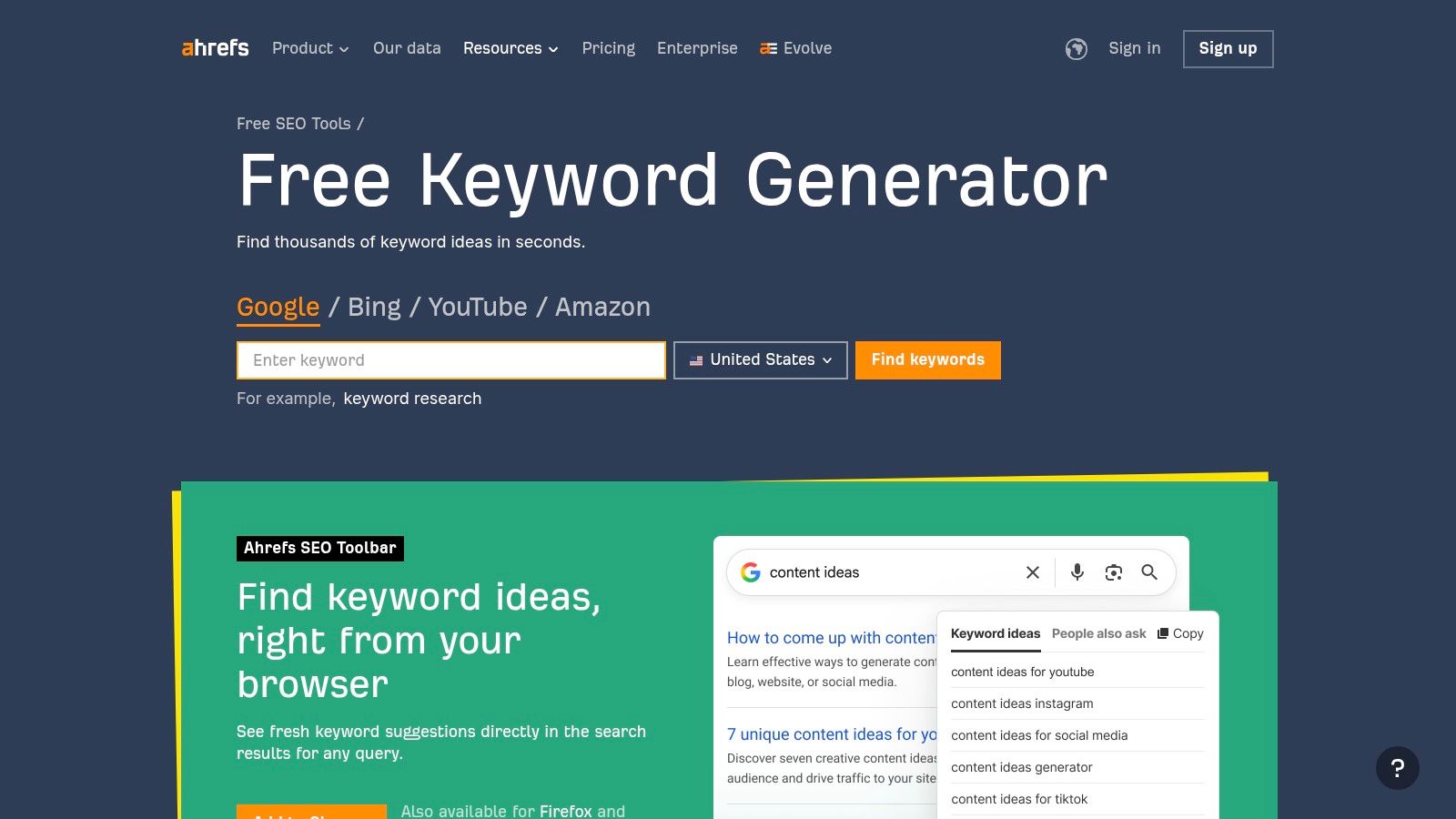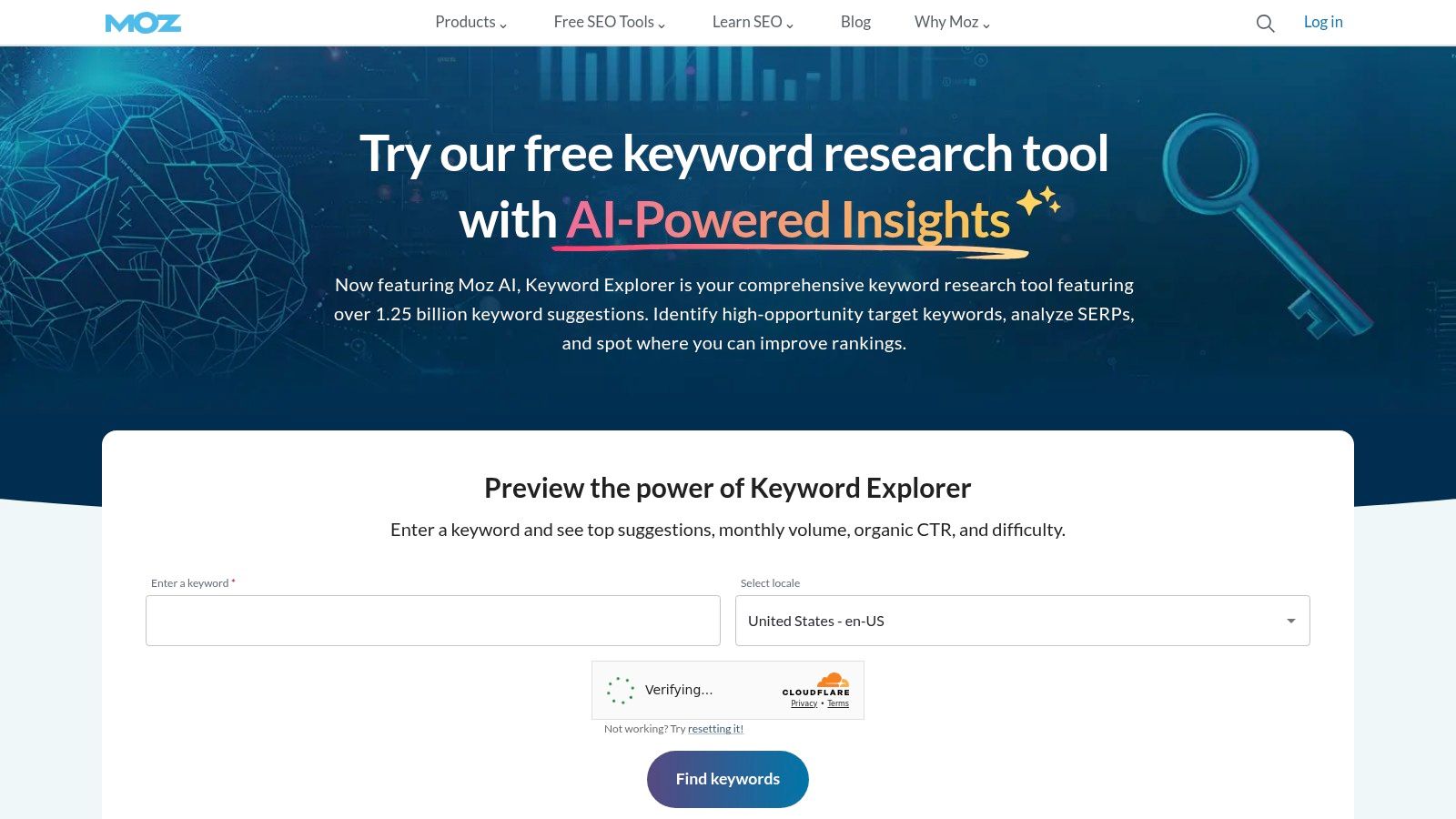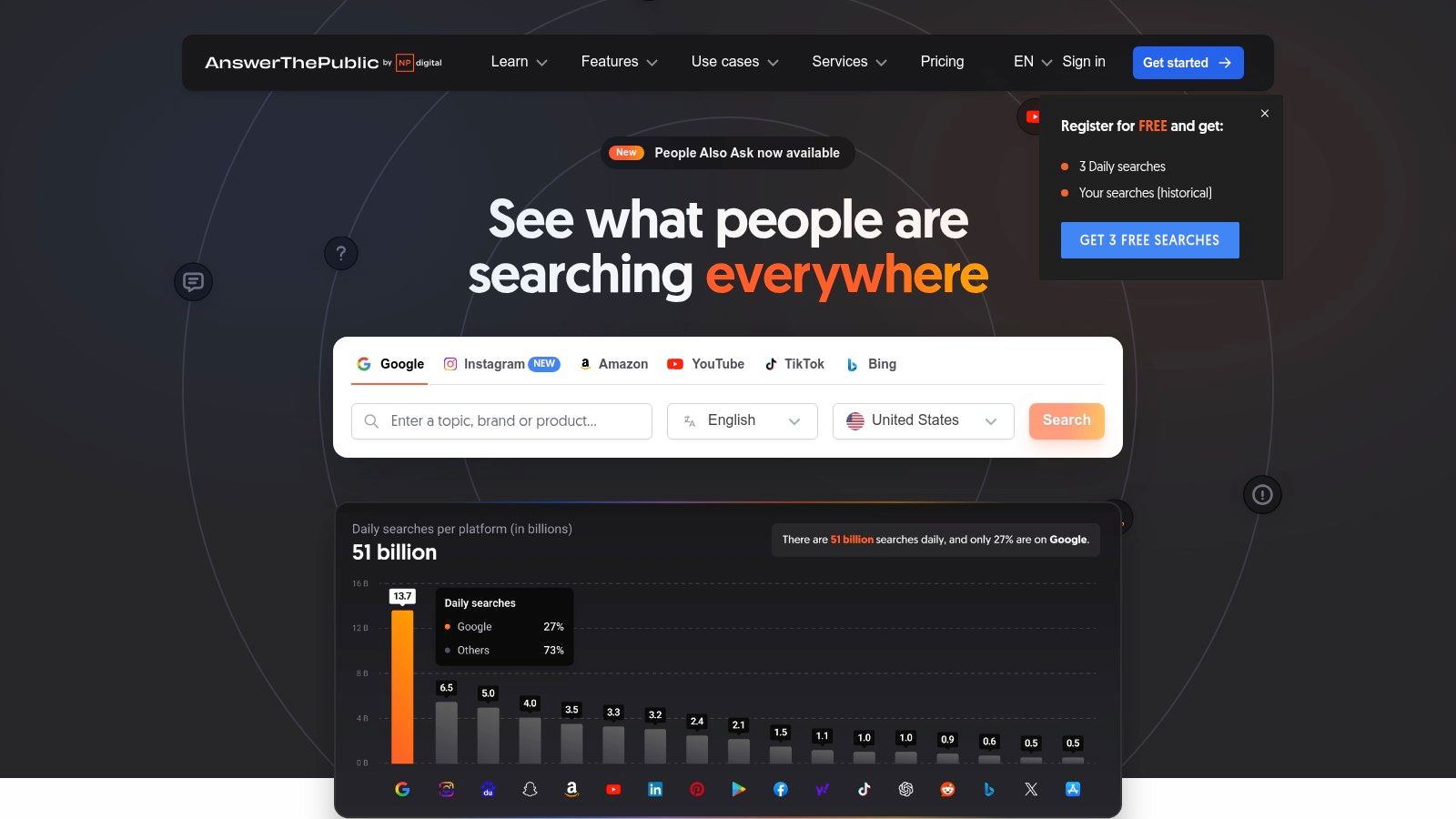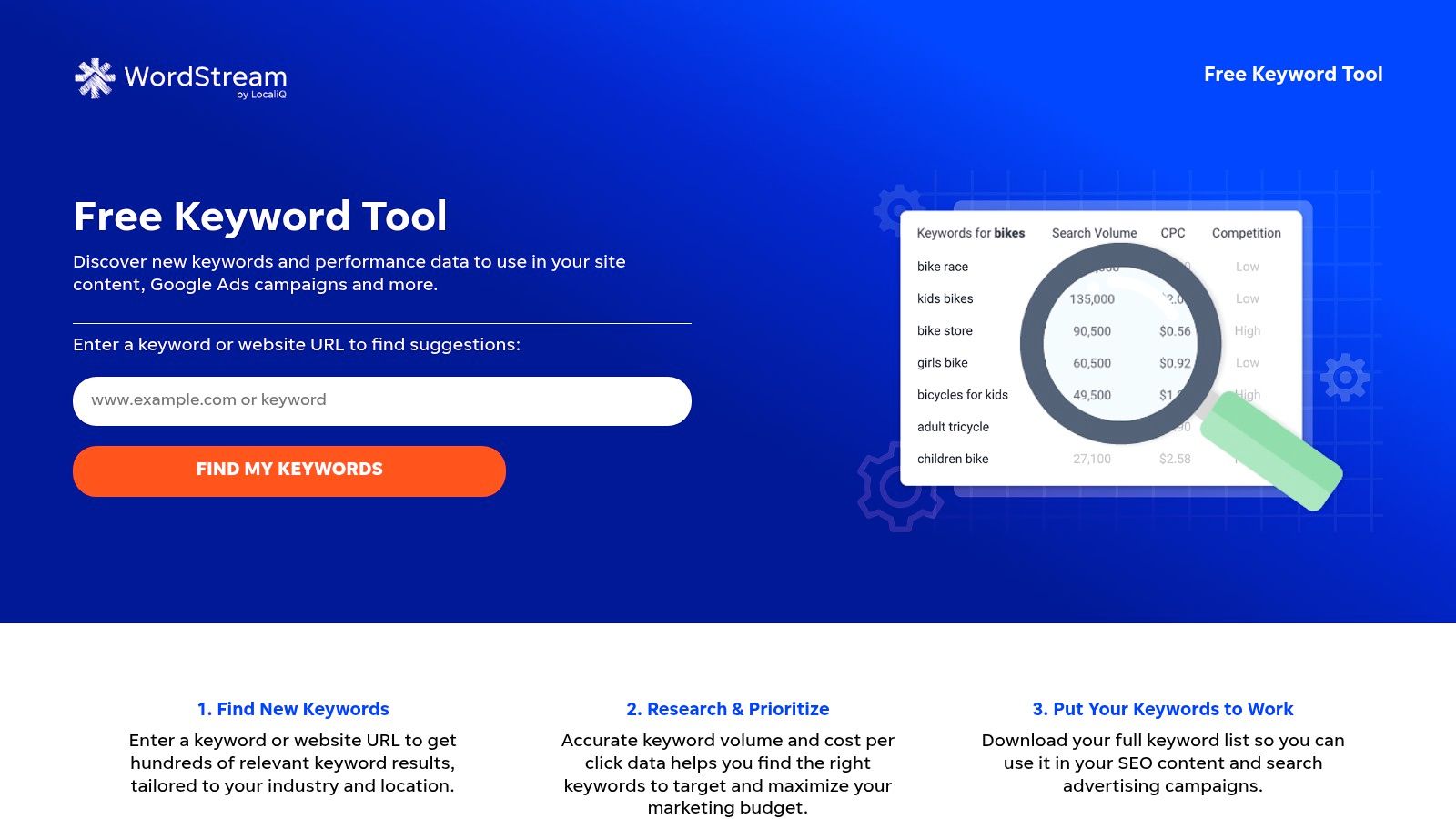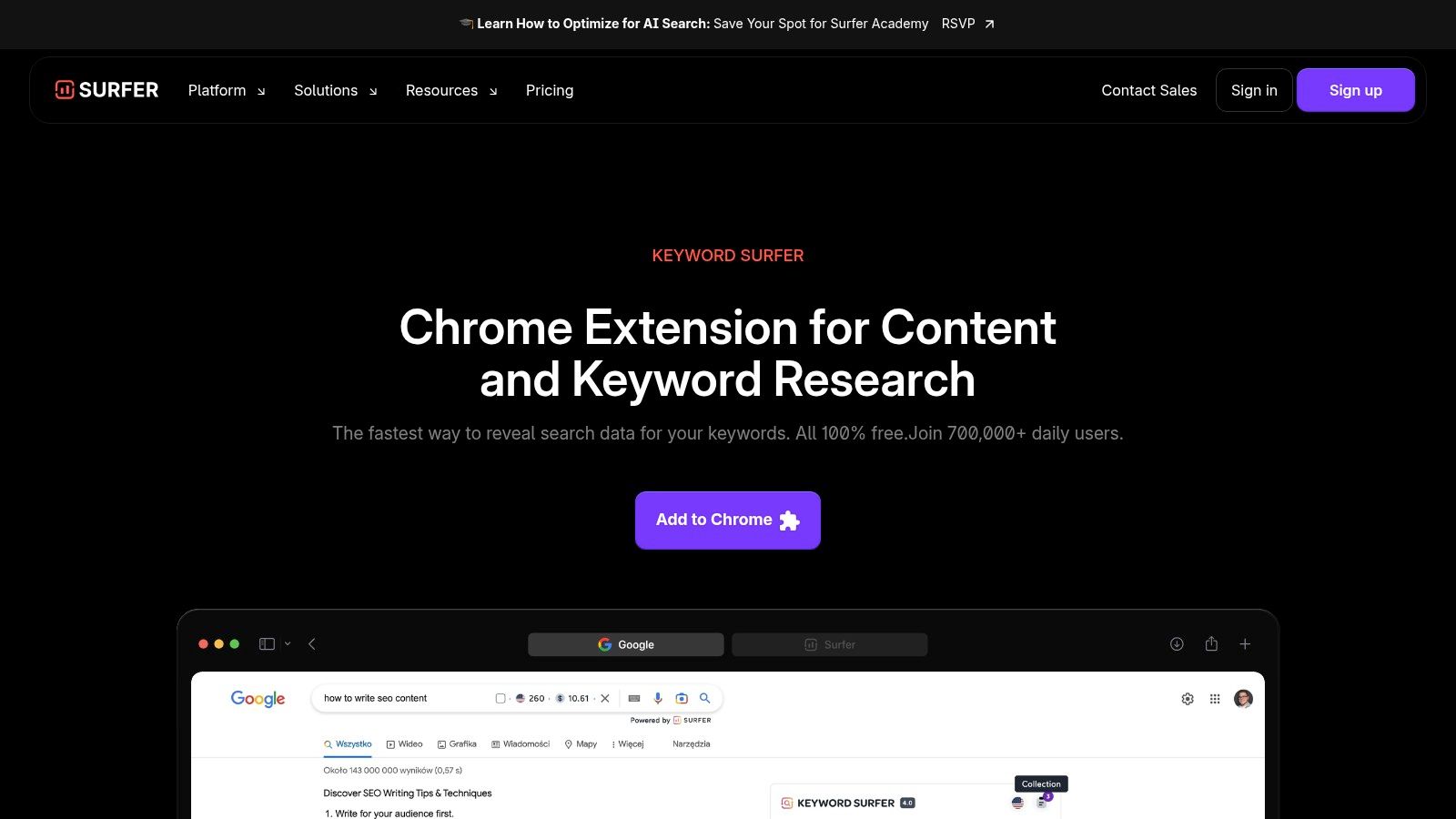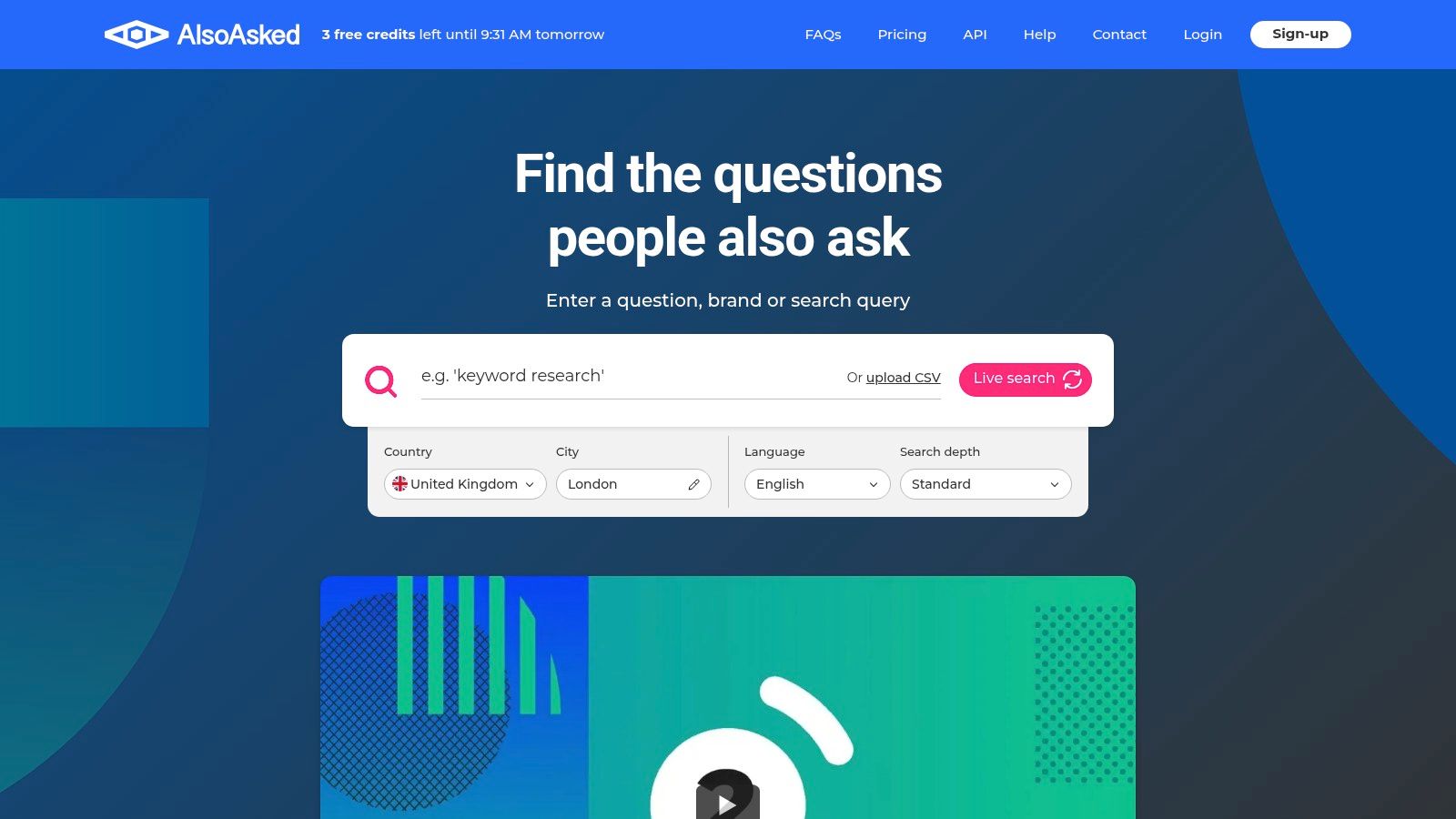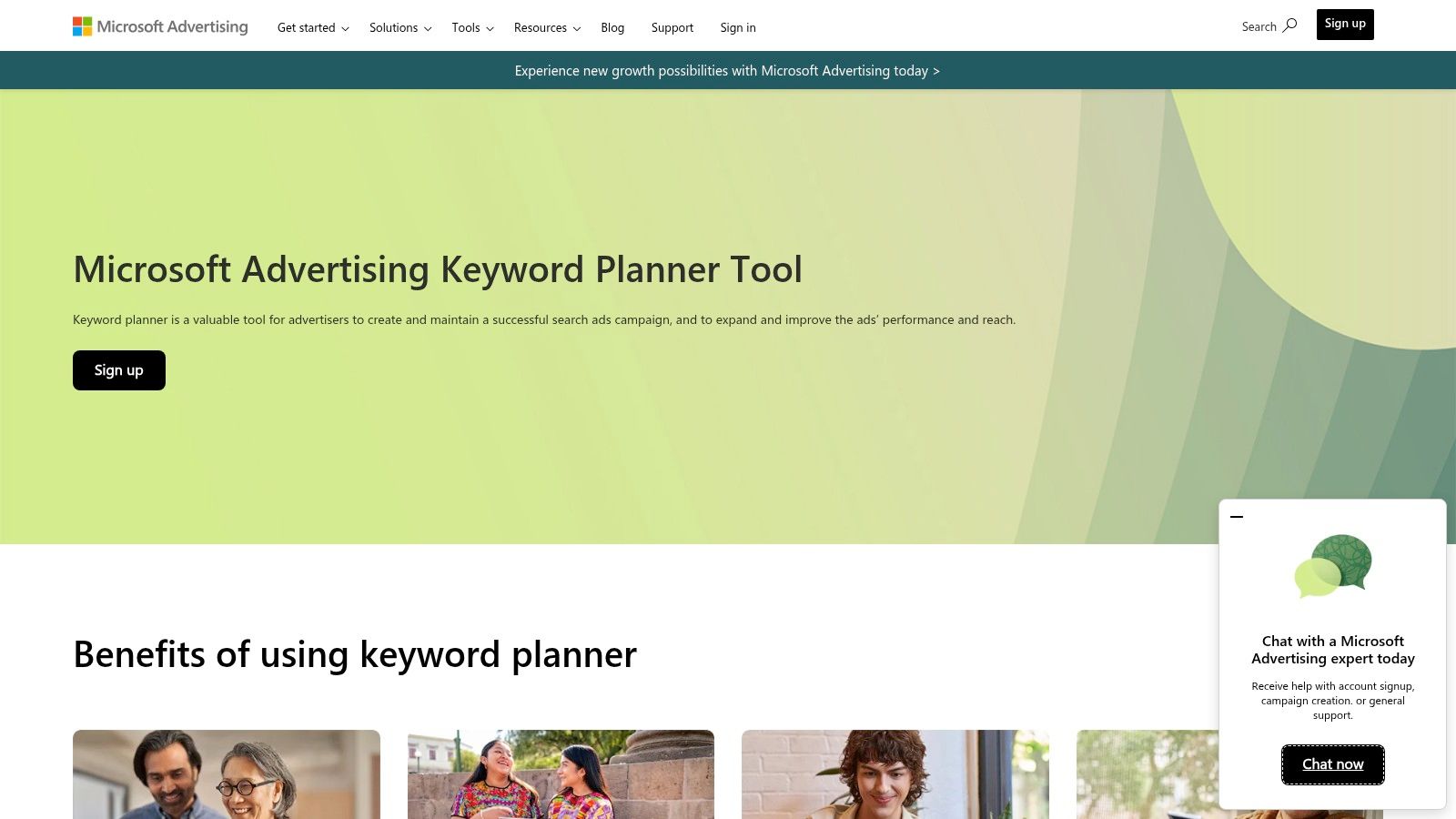12 Best Free Keyword Research Tools for UK Marketers in 2025

Finding the right keywords is the cornerstone of any successful digital marketing campaign, whether you're optimising for organic search or building a high-performing PPC strategy. But you don't need an enterprise-level budget to uncover valuable insights. The digital landscape is filled with powerful, no-cost tools that can help you understand customer intent, analyse competitors, and discover untapped opportunities for growth.
This comprehensive guide cuts through the noise to give you a definitive list of the best free keyword research tools available to UK businesses. We move beyond generic feature lists to provide a practical, in-depth analysis of each platform. Forget surface-level reviews; we’re focused on real-world application.
Inside, you will find a detailed breakdown of 12 leading tools, from foundational platforms like Google Keyword Planner to innovative solutions such as AnswerThePublic. For each tool, we provide:
- A clear overview of its core functionality.
- Honest pros and cons to manage your expectations.
- Specific use-case scenarios for SEO, PPC, and content marketing.
- Step-by-step screenshots and direct links to get you started immediately.
Our goal is to equip you with the knowledge to build a powerful, cost-effective keyword research process. We'll show you how to layer insights from different free tools to create a cohesive strategy that drives measurable results. Let's explore the platforms that will help you make smarter, data-driven decisions for your brand without impacting your budget.
1. Google Keyword Planner
Google Keyword Planner is the original keyword research tool, drawing its data directly from Google’s vast search ecosystem. While designed primarily for pay-per-click (PPC) advertisers, it remains an indispensable resource for SEO, offering foundational insights into what users are searching for. It's completely free to use with a Google account, making it one of the most accessible and best free keyword research tools for any business starting its digital marketing journey.
Its core function allows you to discover new keywords related to your business and see estimates of the searches they receive and the cost to target them. This direct link to Google Ads data is its unique selling proposition; no other tool can claim its data comes straight from the source.
Key Features & Use Cases
The platform is split into two main functions: "Discover new keywords" and "Get search volume and forecasts".
- Keyword Discovery: Enter a seed keyword, and the tool suggests hundreds of related terms, organised by relevance. This is perfect for initial brainstorming and expanding your topic clusters.
- Granular Location Targeting: You can filter search volume data down to specific UK cities or regions, which is invaluable for local SEO and targeted campaigns.
- PPC-SEO Integration: While focused on ad campaigns, the competition and bid estimate data provide a proxy for a keyword's commercial intent. Understanding how to integrate this data can significantly boost your overall strategy; you can learn more about integrating Google Ads with your SEO strategy here.
| Feature | Best Use Case |
|---|---|
| First-Party Data | Foundational keyword research and trend analysis |
| Search Volume Ranges | Gauging the relative popularity of different keywords |
| Seamless Ads Integration | Building and forecasting PPC campaigns directly |
Pros & Cons
Pros:
- Direct Google Data: Unparalleled accuracy for search volume trends.
- Free Access: No cost to use with a Google Ads account.
- PPC Planning: Seamlessly transitions research into active Google Ads campaigns.
Cons:
- PPC-First Interface: The user experience is optimised for advertisers, not SEOs.
- Broad Volume Ranges: Without an active ad spend, search volumes are often bucketed (e.g., 1K-10K), obscuring precise figures.
Website: ads.google.com
2. Google Trends
Google Trends is less a keyword discovery tool and more a data-driven compass for understanding audience interest over time. It visualises the relative popularity of a search query, providing crucial context on seasonality, market shifts, and public consciousness. It’s entirely free and offers an unparalleled view into what’s currently capturing the world's attention, making it one of the best free keyword research tools for content timing and validating topic relevance.
Its unique strength lies in comparing the trajectories of multiple search terms, helping you understand which keywords are gaining traction and which are fading. This insight is invaluable for strategic content planning, ensuring you create assets that align with current or emerging demand.
Key Features & Use Cases
The platform excels at providing directional data to inform your broader marketing strategy, a key consideration for anyone just starting with Google Ads.
- Seasonality Analysis: Discover predictable peaks and troughs in search interest. This is perfect for planning seasonal campaigns, such as for "Christmas gifts" or "summer holidays," far in advance.
- Regional Interest: Filter trend data by UK region or city to identify localised demand. A local business can use this to see if a product is more popular in Manchester than in London.
- Breakout Keyword Discovery: The "Related queries" section can uncover 'breakout' terms, which are keywords that have experienced tremendous growth, helping you capitalise on new trends.
| Feature | Best Use Case |
|---|---|
| Historical Trend Data | Understanding a topic's long-term viability and seasonality |
| Keyword Comparison | Choosing between two similar keywords (e.g., "PPC agency" vs. "Google Ads agency") |
| Related Queries | Identifying rising search terms and related content ideas |
Pros & Cons
Pros:
- 100% Free: Completely free to use with no limitations or account needed.
- Content Timing: Unmatched for identifying when to publish content for maximum impact.
- Market Insight: Provides a high-level view of consumer behaviour and interest shifts.
Cons:
- Relative Data Only: Shows interest on a scale of 0-100, not absolute search volumes.
- Not a Suggestion Tool: Lacks the extensive keyword suggestion features of dedicated tools.
Website: trends.google.com
3. Ahrefs Free Keyword Generator
Ahrefs Free Keyword Generator is a powerful, no-cost entry point into one of the industry's most respected SEO data ecosystems. It provides a generous sample of keyword ideas and metrics, making it an excellent starting point for content brainstorming and initial topic validation. By offering a taste of its premium capabilities, it stands out as one of the best free keyword research tools for those who want quick, actionable insights without an immediate subscription.
Its primary function is to take a seed keyword and instantly return 100 related keyword ideas, complete with estimated monthly search volumes and a Keyword Difficulty (KD) score for the top 10 results. This unique blend of volume and difficulty metrics in a free tool is its key advantage, allowing users to quickly gauge opportunity.
Key Features & Use Cases
The tool is incredibly straightforward, asking for a seed keyword and a target country, including a dedicated UK database.
- Keyword Difficulty (KD) Metric: Provides a score from 0-100, estimating how hard it would be to rank in the top 10 for a keyword. This is invaluable for finding low-competition opportunities.
- Multi-Engine Support: You can research keywords not just for Google, but also for Bing, YouTube, and Amazon, making it versatile for video SEO and e-commerce product research.
- Question-Based Queries: It generates a separate list of 50 keywords phrased as questions, perfect for creating FAQ sections, blog posts, and "People Also Ask" content.
| Feature | Best Use Case |
|---|---|
| Keyword Difficulty (KD) Scores | Quickly identifying low-hanging fruit and achievable ranking targets |
| Multi-Engine Research | Brainstorming video topics for YouTube or product keywords for Amazon |
| Question Generation | Finding specific user problems to solve with your content |
Pros & Cons
Pros:
- Generous Free Results: 100+ keyword ideas are more than enough for initial research.
- Includes Difficulty Score: A premium feature offered for free, providing crucial competitive context.
- Supports UK Database: Delivers relevant search volume and data for UK-focused campaigns.
Cons:
- Limited Metrics: Deeper data like click metrics, parent topics, and full SERP analysis requires a paid plan.
- Daily Usage Limits: The tool is rate-limited to prevent abuse, which may restrict heavy use.
Website: ahrefs.com/keyword-generator
4. Semrush – Keyword Magic Tool
Semrush is a titan in the digital marketing world, and its Keyword Magic Tool offers a powerful glimpse into its comprehensive suite of features. The tool taps into one of the largest keyword databases available, providing a vast pool of ideas organised by topic. Although the full functionality is part of a paid subscription, the free account provides enough data for quick research, making it one of the best free keyword research tools for initial exploration and content brainstorming.
Its main strength lies in its intelligent organisation. When you enter a seed keyword, Semrush doesn't just give you a list; it automatically groups related terms into semantic clusters. This helps you quickly identify subtopics and structure your content marketing efforts more effectively, even with the limitations of a free account.
Key Features & Use Cases
The free version provides a solid foundation for understanding keyword landscapes and discovering new opportunities.
- Huge Keyword Database: Access a portion of Semrush’s extensive database to uncover a wide array of keyword variations, long-tail queries, and related terms.
- Semantic Clustering: Keywords are automatically organised into topic-specific groups, which is perfect for planning content pillars and topic clusters for your website.
- Advanced Filtering: Even on the free plan, you can use filters to narrow down your search, such as the "Questions" filter to find common user queries for your FAQ sections or blog posts.
| Feature | Best Use Case |
|---|---|
| Semantic Keyword Groupings | Structuring content pillars and identifying subtopics |
| Question-Based Filters | Generating ideas for blog posts and FAQ content |
| Broad Match Modifier | Discovering a wide range of long-tail keyword variations |
Pros & Cons
Pros:
- Excellent Organisation: The semantic clustering saves significant time in analysis.
- Strong SERP-Driven Insights: Provides context on SERP features associated with keywords.
- Robust Long-Tail Discovery: Uncovers valuable, less competitive queries even on the free plan.
Cons:
- Limited Results: The free tier restricts the number of keywords you can see and limits access to advanced metrics.
- Requires Account Signup: You must create a free Semrush account to access the tool.
Website: semrush.com
5. Ubersuggest
Ubersuggest is a freemium SEO suite that packages keyword ideas, competitor analysis, and content suggestions into a beginner-friendly dashboard. While many of its advanced features are behind a paywall, its free tier provides a solid entry point for light, everyday research, making it one of the best free keyword research tools for those new to SEO or needing quick insights without a steep learning curve.
Its main appeal lies in its simplicity and the breadth of data it presents in one place. You can get keyword suggestions, view basic SERP analysis, and even track a small number of keywords for a project, all within a few clicks. The free Chrome extension is also particularly useful for getting on-the-fly data directly on Google’s search results pages.
Key Features & Use Cases
The platform offers a surprising range of functions for a free tool, though daily usage is capped.
- Keyword & Content Ideas: Input a seed term to receive a list of related keywords alongside content ideas pulled from top-ranking pages for that query.
- Basic Rank Tracking: Set up a free project to monitor your site’s ranking for a handful of keywords, which is great for small businesses or new websites.
- Chrome Extension: Analyse search volume, CPC, and domain authority for any search result directly on the SERP, streamlining initial research.
| Feature | Best Use Case |
|---|---|
| All-in-One Dashboard | Quick, high-level overview for SEO beginners |
| Free Project Tracking | Monitoring a small set of core keywords for a new website |
| Content Ideas Generator | Brainstorming blog post titles and topics |
Pros & Cons
Pros:
- Simple, Beginner-Friendly Interface: Very easy to navigate and understand the data presented.
- Useful Entry-Level Features: The free rank tracking and site audit are valuable additions.
- Supports UK Targeting: Allows you to filter keyword data specifically for the UK market.
Cons:
- Very Tight Free Daily Limits: You are restricted to just a few searches per day, which limits in-depth research.
- Data Locked Behind Paid Plans: Many advanced metrics, filters, and data exports require a subscription.
Website: ubersuggest.com
6. Moz – Keyword Explorer
Moz Keyword Explorer is a well-respected tool in the SEO industry, offering a sophisticated approach to keyword analysis even in its free version. It provides users with search volume ranges, a keyword difficulty score, and an estimated organic click-through rate (CTR), giving a well-rounded initial view of a term's potential. Its unique "Priority" score helps to quickly identify realistic keyword targets, making it one of the best free keyword research tools for strategists looking to prioritise their efforts effectively.
The free Moz Community account grants limited access to this powerful tool, allowing a set number of queries per month. Its standout feature is the unique Priority score, which blends volume, difficulty, and CTR into a single, actionable metric. This is designed to help you bypass vanity metrics and focus on keywords that offer the best strategic value.
Key Features & Use Cases
Moz’s free offering is designed to provide a glimpse into the platform's robust data, helping you make more informed decisions about where to focus your content and SEO efforts. It’s a great way to understand the competitive landscape and how it fits into the broader digital marketing picture; understanding the differences between SEO and SEM is a crucial first step, and you can learn more about the SEO vs SEM debate here.
- Priority Score: This unique metric combines volume, difficulty, and organic CTR to highlight the keywords with the highest potential for success, saving you time during analysis.
- Organic CTR Score: An estimate of the percentage of clicks a keyword receives on organic results, helping you gauge if SERP features are eating into potential traffic.
- SERP Analysis: Get a snapshot of the top-ranking pages for a given keyword, allowing for a quick competitive assessment.
| Feature | Best Use Case |
|---|---|
| Priority Score | Quickly triaging a long list of keywords to find the best opportunities |
| Organic CTR & Difficulty | Gauging the realism of ranking for a term before investing resources |
| SERP Analysis | Initial competitor research and content strategy planning |
Pros & Cons
Pros:
- Priority score helps triage opportunities: Excellent for quickly identifying low-hanging fruit.
- Well-known difficulty and CTR methodology: Backed by industry-trusted data models.
- Useful for scoping content roadmaps: The data helps build a strategic content plan.
Cons:
- Full functionality requires Moz Pro subscription: Core features like keyword lists and in-depth analysis are behind a paywall.
- Free/community access is limited: The number of free queries per month is restrictive for heavy users.
Website: https://moz.com/explorer
7. KeywordTool.io
KeywordTool.io excels at generating a vast number of long-tail keyword ideas by scraping Google’s Autocomplete suggestions. It provides a simple, fast interface for uncovering the specific questions, prepositions, and comparisons that real users are typing into search engines. While the free version restricts quantitative data, it stands as one of the best free keyword research tools for initial brainstorming and content idea generation.
Its unique strength lies in its ability to pull suggestions not just from Google, but also from YouTube, Bing, Amazon, eBay, and the App Store. This multi-platform approach makes it invaluable for businesses that operate across different digital marketplaces and channels, allowing for highly specific and relevant keyword discovery.
Key Features & Use Cases
The tool is organised around its powerful suggestion engine, which can be tailored for various platforms and regions, including specific targeting for the UK.
- Multi-Engine Suggestions: You can instantly switch between platforms like Google, YouTube, and Amazon to find keywords relevant to each ecosystem.
- Long-Tail Keyword Generation: Excellent for discovering hundreds of low-competition, high-intent long-tail keywords that other tools might miss.
- Question-Based Queries: The "Questions" tab is perfect for finding ideas for FAQ sections, blog posts, and "how-to" guides that directly address user pain points.
| Feature | Best Use Case |
|---|---|
| Autocomplete Scraping | Rapidly generating hundreds of long-tail keyword ideas |
| Multi-Platform Support | Marketplace-specific research for Amazon or video SEO for YouTube |
| "Questions" Filter | Building out topic clusters and creating user-focused content |
Pros & Cons
Pros:
- Very Fast Brainstorming: Generates extensive lists of long-tail ideas in seconds.
- Multi-Engine Coverage: Uniquely useful for Amazon, YouTube, and Bing research.
- Simple Interface: Extremely easy to use with no account required for free searches.
Cons:
- No Free Data: The free version provides keyword ideas but hides all search volume, CPC, and competition data.
- Subscription Required: All valuable metrics and export functions are locked behind a Pro subscription.
Website: keywordtool.io
8. AnswerThePublic
AnswerThePublic is a unique visualisation tool that taps into Google’s autocomplete data to reveal the questions, prepositions, and comparisons people are making around your seed keyword. It organises these queries into intuitive mind maps, making it exceptionally good at uncovering user intent and content gaps. For those looking to build out topic clusters or create comprehensive FAQ sections, it stands out as one of the best free keyword research tools available for pure ideation.
Its strength lies in transforming raw search data into actionable content ideas, showing you the exact phrasing your audience uses. This helps you move beyond basic keywords and create content that truly resonates with user needs.
Key Features & Use Cases
The tool is primarily used for understanding the context around a keyword, rather than just its search volume.
- Question-Based Queries: Generates visualisations for questions (who, what, why, where, how), which is perfect for brainstorming blog post titles, section headers, and FAQ pages.
- Visual Data Maps: Presents data in easily digestible formats like "question wheels" and alphabeticals, simplifying the content planning process for marketers and writers.
- Topic Cluster Ideation: By showing related prepositions (e.g., "keyword research for e-commerce") and comparisons ("keyword research vs competitor analysis"), it helps build out comprehensive, interconnected content hubs.
| Feature | Best Use Case |
|---|---|
| Visual Query Maps | Content ideation and uncovering long-tail questions |
| Preposition/Comparison Data | Building out topic clusters and related articles |
| Free Daily Searches | Quick, high-level brainstorming for a new topic |
Pros & Cons
Pros:
- Captures Search Intent: Superb for understanding the "why" behind a search.
- Visual & Intuitive: The visualisations make complex data easy to understand and share with teams.
- Excellent for Ideation: Uncovers content angles you might otherwise miss.
Cons:
- Strict Free Limit: The free tier is heavily restricted to just a few searches per day.
- No Volume Metrics: It doesn't provide search volume or competition data on its own.
- Limited Data Export: Full data downloads are reserved for paid subscribers.
Website: answerthepublic.com
9. WordStream Free Keyword Tool
WordStream’s Free Keyword Tool offers a quick and easy way to source keyword ideas and essential metrics without requiring a login or subscription. It provides search volume, competition levels, and CPC estimates, making it a valuable asset for marketers who need fast data. This accessibility makes it one of the best free keyword research tools for preliminary research or when you don't have access to a full-fledged SEO suite.
The tool's main appeal is its simplicity; enter a keyword, select your industry and country (including the UK), and you get instant results. While the initial view shows a limited list, the full set of keywords is conveniently emailed to you as a CSV file for further analysis.
Key Features & Use Cases
WordStream's tool is designed for speed and efficiency, focusing on core metrics that inform both SEO and PPC strategies.
- Immediate Results & Full List via Email: Get the top 25 keyword suggestions on-page instantly, with the complete list sent to your inbox. This is ideal for quickly capturing data to use in other applications.
- Country and Industry Filtering: You can narrow down results to specific countries like the United Kingdom and filter by industry, providing more relevant and targeted keyword suggestions for local businesses.
- Essential Data Points: The tool provides search volume, competition (Low, Medium, High), and estimated CPC, giving you a solid overview for initial keyword qualification.
| Feature | Best Use Case |
|---|---|
| Email CSV Download | Quickly building a large seed list for further analysis |
| Industry Filtering | Finding niche-specific terms for targeted content |
| Competition & CPC Data | Gauging commercial intent and PPC campaign viability |
Pros & Cons
Pros:
- No Login Required: Get instant access to data without creating an account.
- Fast and Simple: The user-friendly interface provides numeric data quickly.
- Useful for PPC: A great alternative for scoping out CPC data without a Google Ads account.
Cons:
- Email Required for Full List: To see all keyword suggestions, you must provide your email address.
- Lacks Advanced Metrics: It doesn't offer deeper insights like keyword difficulty or SERP analysis.
Website: www.wordstream.com/keyword-discovery
10. Keyword Surfer (Surfer SEO Chrome extension)
Keyword Surfer is a free Chrome extension from the team at Surfer SEO that integrates keyword research directly into your browsing experience. It overlays crucial data like search volumes, keyword suggestions, and related terms right onto Google's search engine results page (SERP). This in-context approach removes the need to switch between tabs, making it one of the best free keyword research tools for quick analysis and competitor research on the fly.
Its primary advantage is convenience; as you search, Keyword Surfer provides immediate, actionable insights without you having to log in or navigate to a separate platform. The basic features are available for free without a Surfer account, and it fully supports UK-specific data, making it a powerful companion for everyday research tasks.
Key Features & Use Cases
The extension enriches the standard Google SERP with several data panels, helping you make faster research decisions.
- On-SERP Volumes: See the estimated monthly search volume for any query directly in the search bar as you type, with country-specific data available for the UK and many others.
- Keyword Suggestions: A sidebar appears with keyword ideas, showing their similarity to your original query and their search volume. This is brilliant for expanding your topic research.
- Save & Export: You can select and save keywords to a collection directly from the sidebar and export the list as a CSV file for further analysis in other tools.
| Feature | Best Use Case |
|---|---|
| Instant SERP Data | Quick competitor analysis and on-the-fly volume checks |
| Keyword Idea Generation | Expanding content briefs and finding long-tail variations |
| One-Click CSV Export | Building keyword lists quickly while browsing |
Pros & Cons
Pros:
- Instant On-Page Insights: Provides immediate data within your browser, streamlining your workflow.
- Great Research Companion: Perfect for analysing search results and finding new ideas without leaving Google.
- Free & Accessible: The core features are completely free and easy to install.
Cons:
- Browser-Only Workflow: As a Chrome extension, its functionality is limited to your browser.
- Upsell to Paid Plan: Some advanced features and deeper integrations require a paid Surfer SEO subscription.
Website: surferseo.com/keyword-surfer-extension/
11. AlsoAsked
AlsoAsked taps directly into Google's "People Also Ask" (PAA) data, offering a unique, visual approach to understanding user intent. It reveals the questions searchers are asking around your core topics, making it an exceptional tool for content ideation and structuring articles. By mapping out these question-based relationships, it provides a clear roadmap for creating comprehensive content that directly addresses user queries, solidifying its place among the best free keyword research tools for topical authority.
The platform's strength lies in its ability to visualise the journey a user takes as they explore a topic, branching from one question to the next. This insight is invaluable for building out FAQ sections, structuring blog posts, and identifying long-tail keyword opportunities that other tools might miss. The free tier provides a limited number of searches per day, which is perfect for targeted research sessions.
Key Features & Use Cases
AlsoAsked excels at revealing the nuances of user curiosity, helping you preemptively answer the next logical question in your content.
- Visual PAA Mapping: The tool generates intuitive mind maps that show how questions relate to one another, making it easy to see content gaps and opportunities.
- Content Structure Planning: Use the visualised data to outline your articles, ensuring each section logically flows into the next based on real user search patterns.
- UK-Specific Searches: You can set the search region and language specifically to the UK, ensuring the PAA data is relevant for your target audience.
| Feature | Best Use Case |
|---|---|
| PAA Question Visualisation | Planning content structure and building FAQ sections |
| Free Daily Searches | Ad-hoc research for specific blog posts or content briefs |
| Regional & Language Controls | Uncovering user intent for a UK-based audience |
Pros & Cons
Pros:
- Deep User Intent Insights: Goes beyond keywords to reveal the specific questions users have.
- Excellent for Topical Clustering: Helps organise content ideas into logical, comprehensive clusters.
- Intuitive Visual Interface: The mind map format is easy to understand and use for planning.
Cons:
- Limited Free Searches: The free tier is restricted to a few searches per day.
- No Search Volume Data: Focuses purely on PAA questions, not their search volumes.
- Advanced Features are Paid: Exporting data and bulk searches require a paid subscription.
Website: https://alsoasked.com
12. Microsoft Advertising Keyword Planner (Bing)
While Google dominates the search landscape, Microsoft's Bing network holds a significant and often overlooked market share, especially in the UK. The Microsoft Advertising Keyword Planner is the Bing equivalent of Google’s tool, drawing data directly from its own search ecosystem. It’s an essential, complementary resource for any comprehensive SEO strategy, allowing you to validate data and uncover opportunities where competition might be lower. It's completely free with a Microsoft Advertising account, making it one of the best free keyword research tools for a multi-channel approach.
Its primary function mirrors Google's: discover new keywords and get search volume and cost estimates. The unique value comes from its first-party Bing data, providing a second source of truth to cross-reference against Google's figures and identify unique search behaviours on the Bing network.
Key Features & Use Cases
The tool is structured for advertisers but offers clear benefits for SEO and content creation, helping you understand a different segment of the search market.
- Keyword Suggestions: Enter a seed keyword to get a list of related terms specific to the Bing search network, which can reveal different user intent or phrasing.
- UK-Specific Targeting: Like Google's tool, you can filter volume data down to specific UK cities and regions, which is crucial for local businesses wanting to capture the Bing audience.
- PPC Strategy Diversification: The cost estimates and competition data are invaluable for planning a Bing Ads campaign. Understanding how this channel compares to Google can inform your budget allocation; you can explore the differences between Google Ads and Bing Ads here.
| Feature | Best Use Case |
|---|---|
| First-Party Bing Data | Cross-referencing Google data and finding lower-competition keywords |
| Search Volume Data | Gauging keyword popularity on the Bing network |
| Ad Group Suggestions | Organising keywords for a parallel Bing Ads campaign |
Pros & Cons
Pros:
- Direct Bing Data: Provides an alternative, reliable data source to Google.
- Free to Use: No cost required once you have a Microsoft Advertising account.
- Strategic Diversification: Helps uncover opportunities on a less saturated search engine.
Cons:
- PPC-First Design: The interface and metrics are built for advertisers, not SEOs.
- Account Required: You must sign up for a Microsoft Advertising account to access it.
Website: about.ads.microsoft.com/en/tools/planning/keyword-planner
Top 12 Free Keyword Research Tools: Feature Comparison
| Tool | Key features (✨) | Best for (👥) | Quality (★) | Pricing/value (💰) | Standout (🏆) |
|---|---|---|---|---|---|
| Google Keyword Planner | Search volumes, forecasts, CPCs, granular UK targeting ✨ | PPC managers & campaign planners 👥 | ★★★★★ | 💰 Free (Google Ads acct) | 🏆 First‑party Google data & Ads hand‑off |
| Google Trends | Real‑time & historical interest, seasonality, UK regions ✨ | Content planners & trend spotters 👥 | ★★★★☆ | 💰 Free | 🏆 Best for seasonality & emerging searches |
| Ahrefs Free Keyword Generator | 100+ ideas, KD scores, multi‑engine support ✨ | Idea generation & competitor research 👥 | ★★★★☆ | 💰 Free (limits); paid for full tool | 🏆 Generous free ideas with difficulty metric |
| Semrush – Keyword Magic Tool | Huge DB, semantic clustering, Q‑filter ✨ | SEO/PPC teams needing breadth 👥 | ★★★★★ | 💰 Freemium (limits); paid for full access | 🏆 Extensive keyword breadth & grouping |
| Ubersuggest | Keywords, content ideas, basic audits, Chrome ext ✨ | Beginners & small businesses 👥 | ★★★☆☆ | 💰 Freemium (tight daily limits) | 🏆 Simple, beginner‑friendly UI |
| Moz – Keyword Explorer | Volume ranges, difficulty, organic CTR, Priority score ✨ | Content strategists & SEO planners 👥 | ★★★★☆ | 💰 Free community (limited); Moz Pro paid | 🏆 Priority score for opportunity triage |
| KeywordTool.io | Autocomplete suggestions (Google, YT, Amazon) ✨ | Long‑tail brainstorming & marketplace research 👥 | ★★★★☆ | 💰 Free suggestions; Pro for volumes/exports | 🏆 Fast multi‑engine autocomplete lists |
| AnswerThePublic | Visual question maps for who/what/why/how queries ✨ | Content creators & copywriters 👥 | ★★★★☆ | 💰 Free (small daily); paid for exports | 🏆 Visuals for intent mapping & briefs |
| WordStream Free Keyword Tool | Volumes, competition, CPC; CSV by email ✨ | Quick numeric checks & non‑Ads users 👥 | ★★★☆☆ | 💰 Free (email gated) | 🏆 Fast numeric data without Google Ads access |
| Keyword Surfer (Chrome) | On‑SERP volumes, related terms, CSV export ✨ | SERP research & quick competitor checks 👥 | ★★★★☆ | 💰 Free extension; paid Surfer tie‑ins | 🏆 Instant on‑page insights while browsing |
| AlsoAsked | Visualises People Also Ask trees; UK controls ✨ | Topic clustering & FAQ structure 👥 | ★★★★☆ | 💰 Free tier (limited); paid for bulk | 🏆 Excellent for structuring articles from PAA |
| Microsoft Advertising Keyword Planner (Bing) | Bing volumes/CPCs, flexible UK targeting ✨ | Advertisers diversifying beyond Google 👥 | ★★★★☆ | 💰 Free (Microsoft Ads acct) | 🏆 First‑party Bing dataset to cross‑check Google |
Choosing the Right Tools for Your Strategy
Navigating the landscape of keyword research can feel overwhelming, but as we've explored, you don't need a significant budget to get started. The comprehensive list of the best free keyword research tools detailed in this article provides a powerful arsenal for any UK business, from a new startup to an established SME looking to refine its digital marketing approach. The key takeaway is that no single free tool offers a complete solution. Instead, the real power lies in a strategic, layered approach.
By synthesising data from multiple sources, you can build a far more nuanced and effective keyword strategy. For instance, you might begin with the broad, foundational data from Google Keyword Planner, then cross-reference those ideas with real-world search behaviour insights from Google Trends. From there, you can dive deeper into user intent and question-based queries using tools like AnswerThePublic and AlsoAsked, uncovering the specific problems your audience is trying to solve.
Moving from Data Collection to Strategic Action
The most crucial step is translating raw data into actionable insights. A list of keywords is just a starting point; understanding the competitive landscape, search intent, and commercial value behind each term is what drives results. This is where combining tools becomes essential.
Here’s a practical workflow you can adopt:
- Foundation & Volume: Use Google Keyword Planner or Microsoft Advertising Keyword Planner to establish baseline search volumes and initial keyword ideas relevant to your core products or services.
- Intent & Questions: Layer on insights from AnswerThePublic or AlsoAsked to understand the 'who, what, why, where, and how' behind your core topics. This is invaluable for creating content that genuinely helps your audience.
- Competitive Analysis: Employ tools like Ubersuggest's free version or Ahrefs Free Keyword Generator to get a snapshot of keyword difficulty and see what your competitors are ranking for.
- On-the-Fly Research: Integrate Keyword Surfer into your daily workflow to analyse SERPs directly in your browser, keeping your finger on the pulse without interrupting your research process.
This multi-tool methodology helps mitigate the limitations inherent in any single free platform. Where one tool has restrictive daily search limits, another might offer unlimited queries on a smaller dataset. By leveraging their collective strengths, you can create a robust process that rivals many paid alternatives, giving your business a significant competitive edge without the associated costs.
Final Thoughts on Implementation
Remember, effective keyword research is not a one-time task but an ongoing cycle of discovery, implementation, and refinement. Search trends evolve, new competitors emerge, and your customers' needs change. Regularly revisit your keyword strategy using this toolkit to ensure your marketing efforts remain relevant and effective.
The goal isn't just to find keywords; it's to understand the language of your customer and meet them where they are. While these free resources provide the data to get you there, turning that research into profitable, scalable PPC campaigns requires expertise and dedicated management. This is particularly true for busy marketing managers and brand owners who need to maximise their return on investment. The selection of the best free keyword research tools is your first step; the next is expert execution.
Ready to transform your keyword research into market-leading PPC results? At PPC Geeks, our UK-based specialists live and breathe data-driven advertising, using expert insights to build Google Ads campaigns that deliver tangible growth. Get a free, comprehensive PPC audit today to see how we can help you scale your business.
Author
Search Blog
Free PPC Audit
Subscribe to our Newsletter
The Voices of Our Success: Your Words, Our Pride
Don't just take our word for it. With over 100+ five-star reviews, we let our work-and our satisfied clients-speak for us.
"We have been working with PPC Geeks for around 6 months and have found Mark and the team to be very impressive. Having worked with a few companies in this and similar sectors, I rate PPC Geeks as the strongest I have come across. They have taken time to understand our business, our market and competitors and supported us to devise a strategy to generate business. I value the expertise Mark and his team provide and trust them to make the best recommendations for the long-term."
~ Just Go, Alasdair Anderson

